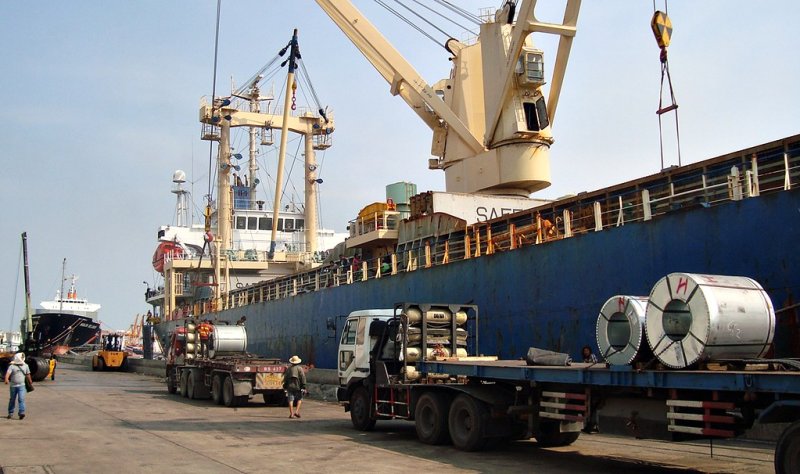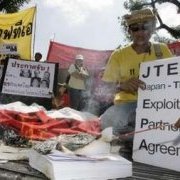- Negotiations

The Japanese and Thai governments started exploring a possible bilateral FTA in 2001-2002, but official negotiations didn’t start until February 2004. They concluded their talks in April 2007 and the Japan-Thailand Economic Partnership Agreement (JTEPA) came into force on 1 November 2007.
The FTA is comprehensive, covering trade in goods and services, investment, intellectual property rights, agriculture, competition policy, etc.
It was strongly opposed by social movements both in Thailand and Japan. Thai groups mobilised against the FTA’s provisions on patenting life forms, toxic wastes and investment. One special concern was that the Japanese would take advantage of the deal not to ship Thai healthworkers to Japan (as under Japan’s FTAs with the Philippines and Indonesia) but to operate an exclusive health facility in Thailand, for Japanese people, who would be flown in to avail of the best medical personnel Thailand has to offer — who would then be unavailable to treat poorer Thai citizens. A major row also erupted around the legalities of Thailand’s interim military regime pushing through the ratification and entry into force of the deal during their hold on the country after the September 2006 coup. Japanese groups mobilised particularly on the potential of the deal to increase Japan’s exports of toxic waste to Thailand.
last update: May 2012
Photo: Paul the Seeker / CC BY 2.0
1-Oct-2007
Bangkok Post
Japanese civil and consumer rights groups have thrown their support behind the Thai anti-FTA movement by petitioning their own government not to rush into signing the Thai-Japan free trade agreement with the interim Surayud Chulanont administration.
25-Sep-2007
The Thai government has decided to conduct an exchange of diplomatic notes with the Japanese government on 2 October 2007, which will put the Japan-Thailand Economic Partnership Agreement (JTEPA) into effect within 30 days without bringing the matter under the scrutiny of the National Legislative Assembly. Prime Minister Surayut Chulanont defiantly announced that he would resign if ever a petition was made to the Constitutional Court and his decision proved to be in violation of the constitution.
24-Sep-2007
Bangkok Post
Thailand’s Prime Minister Surayud Chulanont should think carefully before effecting the Japan-Thailand Economic Partnership Agreement (JTEPA) on November 1 without legislative body approval because such an action could violate the constitution, according to the FTA Watch group.
11-Sep-2007
Nation
Thailand’s Deputy Prime Minister and Industry Minister Kosit Panpiemras said the Japan Thailand Economic Partnership Agreement (JTEPA) will help boost Thailand’s business potential but Japan’s investment in Thailand will fall.
20-Jun-2007
Despite the current political problems prevailing in Thailand, the country will move ahead with trying to implement the Japan-Thailand Economic Partnership Agreement (JTEPA), signed earlier this year, as soon as possible for the benefit of both countries, Thai Prime Minister Surayud Chulanont said Wednesday.
7-Jun-2007
More Japanese nationals will receive medical treatment at Thailand’s private hospitals in 2007, according to a new survey conducted by Kasikorn Research Centre.
8-Apr-2007
Prime Minister Surayud Chulanont dismissed criticism of his signing the Japan-Thailand Economic Partnership Agreement (JTEPA) as voiced by various sectors in Thailand.
3-Apr-2007
FTA Watch
Today is a day of the deepest shame for Thailand and the Tai people. The coup-installed government of Gen Surayuth Chulanon has decided to sign a free trade agreement with Japan. This is in spite of the nation-wide impact that this agreement will have on the environment, biological resources, farmers, patients, small businesses and the majority consumers of health services. We insist that JTEPA as signed by the government today is null and void. We reject it and refute any obligations it places on the Thai people.
3-Apr-2007
MCOT
Thai Prime Minister Surayud Chulanont and his Japanese counterpart Shinzo Abe on Tuesday signed a landmark free trade accord which proponents in Thailand hope will boost bilateral trade, but which has drawn protests from non-governmental organisations and environmental activists.
2-Apr-2007
The Japan-Thailand Economic Partnership Agreement (JTEPA) could put Thailand at a disadvantage if it focuses more on competition than on co-operation in educational services, participants at a brainstorming session claimed yesterday.







